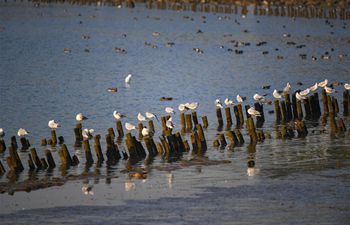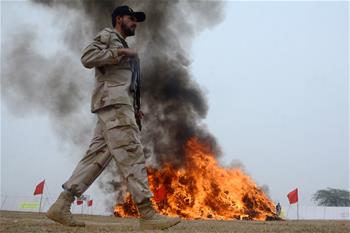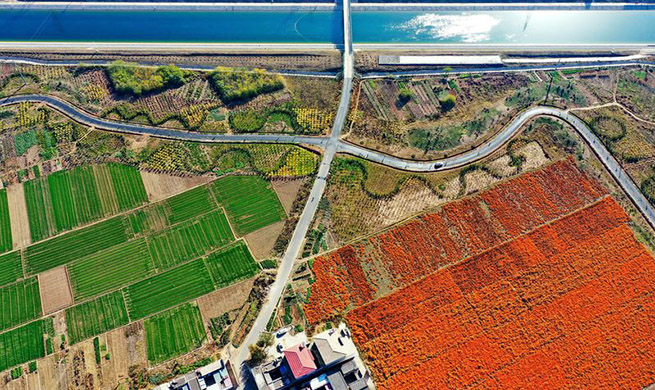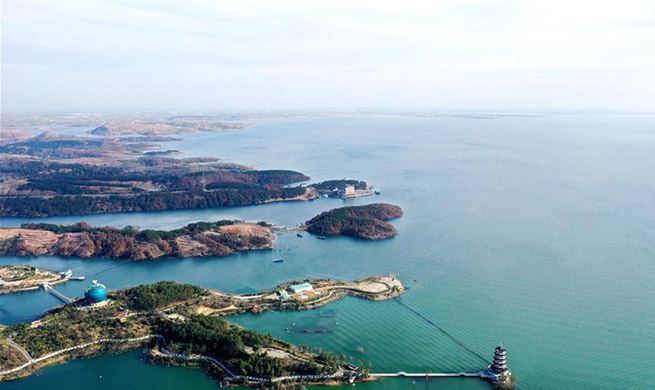by Burak Akinci
ANKARA, Dec. 11 (Xinhua) -- Turkish President Recep Tayyip Erdogan said that his country would have the right to deploy soldiers in Libya if it was invited by the internationally-backed Libyan government, a move which could open a new stage in the power struggle in the Mediterranean, experts said.
Erdogan's remarks came after a controversial gas deal between Ankara and Tripoli which has already upset Turkey's antagonists in the region.
"The activity of sending soldiers in response to such a call from Libya's national government can never be interpreted" as a violation of the UN embargo, Erdogan said Monday in an interview with state-run TRT television.
On Tuesday, during a speech in Ankara, the Turkish strongman reiterated his views on sending troops to Libya, speaking of "sufficient" soldiers, without elaborating further.
His remarks came weeks after Ankara signed a defense and maritime boundaries agreement with Libya, which aimed at strengthening forces controlled by Prime Minister Fayez al-Sarraj's government in Tripoli, as the Libyan capital comes under attack from eastern-based strongman Khalifa Haftar.
The deal also grants Turkey the right to use Libyan airspace and waters, as well as the right to build military bases on Libyan territory.
The maritime border agreement could give Turkey access to a contested economic zone across the Eastern Mediterranean Sea, fueling tensions in Turkey's dispute with Greece, Cyprus and Egypt over oil and gas drilling rights in the area.
Oytun Orhan, coordinator of the Ankara-based Center for Middle Eastern Strategic Studies (Orsam), believes that by indicating to send troops to Libya, Turkey is expressing support for the internationally recognized Libyan government and showing a sign of deterrence to rebel forces and their backers.
"Turkey is trying to protect its vital interests in Eastern Mediterranean. The deal inked with Libya has broken Turkey's regional isolation in the region and is a game changer regarding energy exploration there," he told Xinhua.
Haftar's army has said it would enter Tripoli by the end of the year.
Ibrahim Karagul, an international relations expert and columnist at the pro-government daily Yeni Safak, remarked that Erdogan's statement "is bound to cause serious tremors in every country's position in the Mediterranean."
Karagul indicated that the European Union and other regional countries such as Egypt and Israel had preferred to ignore and reject Turkey's rights in the region of energy resources and drillings.
But now Turkey has made its geopolitical moves to preserve its interests in the Mediterranean, said Karagul.
Turkey has sent several drilling ships protected by gunboats to contentious fields off Cyprus since the start of the year amid sanctions and warnings from the European bloc and the United States.
Libya is a country rich in oil and gas reserves that borders important Mediterranean trade routes. The country's destabilization had financial consequences for Turkey as well as other regional countries.
Orhan also pointed out the ideological aspect of Turkish interference in the Libyan conflict. Haftar is supported by Saudi Arabia, the United Arab Emirates and Egypt, three countries which have strained ties with Turkey who supports their rival Qatar in the Gulf crisis and has even established a military base in Doha.
Along with the Libyan unity government, Turkey and Qatar are able to form a counterweight to the power bloc centered around Saudi Arabia, Orhan argued.













